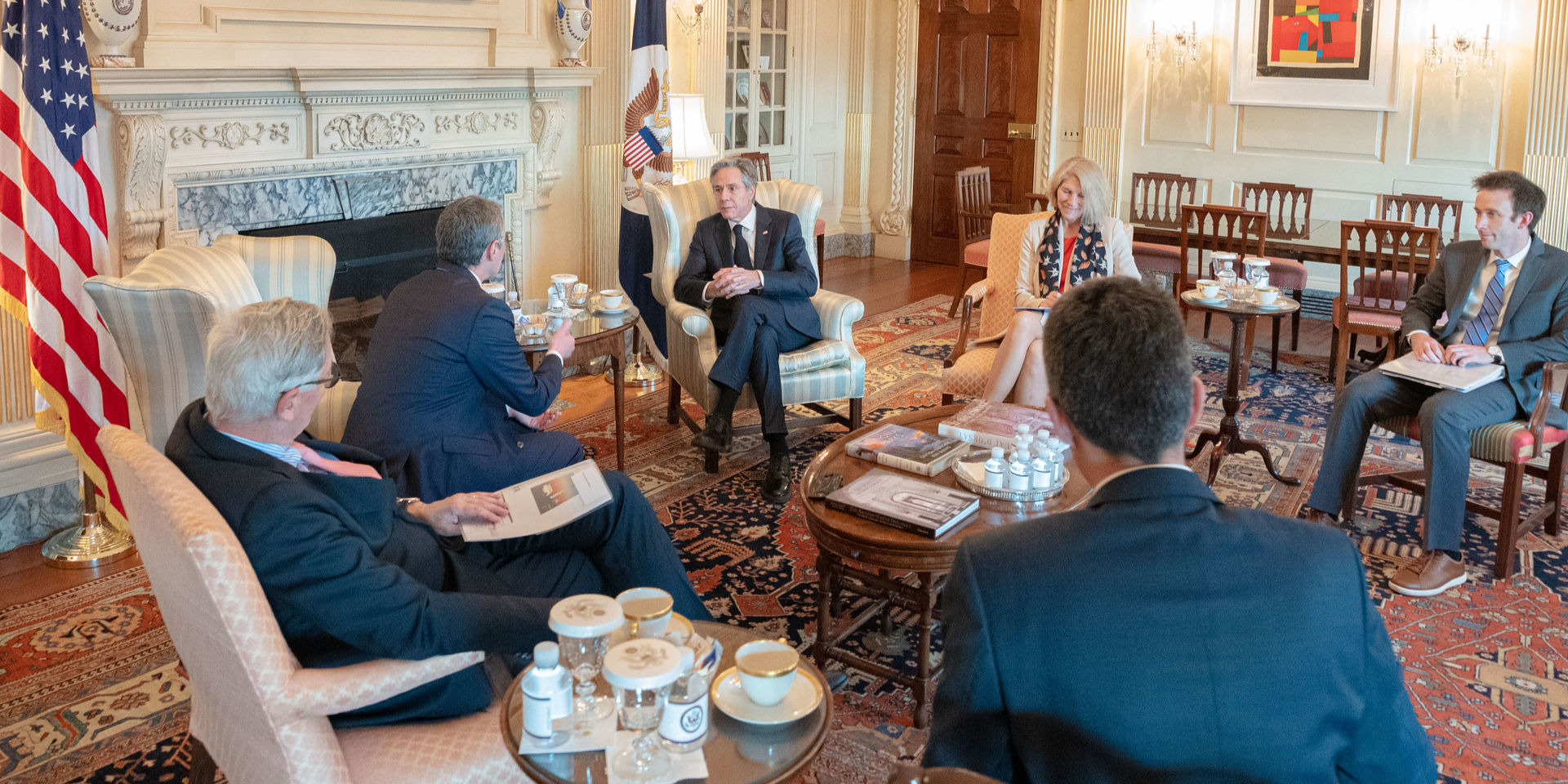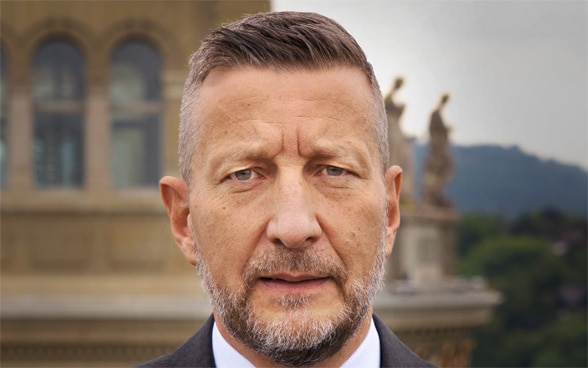«We've already played a significant role in Colombia's peace processes»
The Federal Council adopted the Americas Strategy 2022–25 in February 2022. Ambassador Mirko Giulietti, who heads the FDFA's Americas Division, takes stock of the new strategy's first year and focuses on two countries with developments of particular interest to Switzerland: leading the advisory group for the Colombian peace talks and transforming the embassy in Haiti into a humanitarian office.

Direct contacts at the highest level: Federal Councillor Ignazio Cassis talks with US Secretary of State Anthony Blinken in Washington on 13 January 2023. © U.S. Department of State
Mr Giulietti, it's been a year since the Federal Council adopted this first-ever Americas Strategy. As the head of the FDFA's Americas Division, to what extent does this facilitate your work in the region?
The Americas Strategy is part of the Federal Council's foreign policy strategy cascade and sets out the geographical and thematic priorities for the region, helping us to manage our resources in a more targeted way both at head office in Bern and in our external network abroad. It also gives us a more solid foundation when discussing issues at consultations with our partners. There isn't really anything very new in the goals that have been set, but the strategy has helped us to address and coordinate the main ones across the whole federal administration. That said, all of us need to improve how we link the geographical strategies with the sectoral and thematic ones, so that all federal units can benefit more from our bilateral contacts and consultations. This takes time, but we're going in the right direction.

Where are the goals set out in the strategy implemented? Where have targets already been met? Where is it particularly difficult to realise the strategy's objectives?
Our division has just finished a first 'light' assessment of how the goals are being implemented. We're making good progress on the 'classic' issues in general – negotiating the updating of free trade and double taxation agreements, withdrawing SDC support from bilateral cooperation in a responsible manner, as well as addressing and mainstreaming the promotion and protection of human rights in our bilateral consultations. We do need to make greater efforts when it comes to scientific cooperation in Latin America, however. Our consultations and exchanges demonstrate that there's a good deal of interest, but we haven't yet managed to put this effectively into practice. This is where the strategy is helping us to shine light on areas that used to be somewhat hidden.
Switzerland and the US concluded a strategic partnership dialogue agreement in September 2022. What does this mean for the US, which has a key role in Switzerland's Americas Strategy?
The US's approach to global and regional challenges impacts us significantly, which is why it is one of Switzerland's priority countries in terms of foreign policy as well as an essential partner. Overall, Swiss-US ties are very close; the US is also our most important trading partner, even before Germany. There isn't a single issue at the diplomatic level that we don't cover in our bilateral relations: trade, security, promoting democracy and human rights, combating climate change, cybersecurity, digitalisation, taxation, scientific cooperation, counterterrorism, protecting intellectual property, to name just a few.
These close mutual ties are therefore reflected in our Americas Strategy. The Swiss-US strategic partnership dialogue, which takes place once a year at state secretary level, allows us to address these wide-ranging issues in a way that is structured and ensures continuity of dialogue. It also complements the work done by Switzerland's other state secretariats such as SECO's joint economic commission, or the State Secretariat for International Finance's exchanges with the US tax authorities. In fact, both SECO and SIF were part of the Swiss delegation to the strategic partnership dialogue in Bern in 2021 and Washington in 2022, which shows the wide range of topics that were covered.
The strategy also singles out what it refers to as 'jaguar economies', countries that are developing dynamically in terms of their economy. However, these states also fall short when it comes to good governance and the protection of human rights. What is Switzerland's approach here?
The vast majority of Latin American countries have managed to overcome decades of dictatorship peacefully. They've created spaces for peaceful public debate and strengthened institutions. They've allowed academia to carry out independent research, and the private sector to innovate and create jobs. This is a process that has been willed, supported and advanced by local citizens. Of course there are still shortcomings like widespread corruption, a veritable scourge permeating the whole of society and affecting people's rights to health, education and security, for example.
Which clearly leads to growing discontent – like the demonstrations and violent clashes in the region we keep hearing about.
You can see which governments have authoritarian tendencies, and in some countries, human rights defenders and environmentalists end up paying for their commitment with their lives. Indeed, Latin America is one of the world's most violent regions today. But don't forget that most recent elections have been peaceful – losers have conceded defeat and governments have taken up office, although they may sometimes have to contend with hostile parliaments.
What can Switzerland do here?
As I mentioned earlier, the Americas Division always raises human rights in our bilateral consultations. Another FDFA unit, the Peace and Human Rights Division (PHRD), also conducts bilateral human rights dialogues with certain states. In addition, Swiss embassies can avail of microcredits to fund projects aimed at promoting and protecting human rights, carried out together with the local authorities in a transparent manner. And in terms of policy coherence, we make sure that human rights principles are respected in economic promotion, for example.
Switzerland also works closely with a number of Latin American countries in multilateral forums dealing with such issues as the protection of minors, freedom of expression, human rights in connection with anti-drug measures, dealing with the past, the prevention of torture, etc. By engaging in this type of multilateral cooperation, Latin American governments are clearly signalling their interest in advancing individual rights at home as well.
The strategy defines Colombia as a 'jaguar economy'. In November 2022, the Colombian government and National Liberation Army (ELN) rebel group invited Switzerland to accompany the country's peace talks. What is Switzerland's remit here?
Switzerland was invited together with Germany, Spain and Sweden to 'accompany' the peace process. All of these countries are in the Grupo de Países de Apoyo, Acompañamiento y Cooperación a la Mesa de Conversaciones (GPAAC), currently chaired by Switzerland. They provide political and diplomatic support for the peace process as well as technical support in specific thematic areas. For example, during peace negotiations with the Revolutionary Armed Forces of Colombia (FARC) several years ago, Switzerland provided technical expertise regarding ceasefires, weapons storage and dealing with the past.
Switzerland has extensive expertise in peace policy and good offices. It has also been active in Colombia for a number of years and in a variety of areas. Do you think that was why Switzerland was asked to be part of the advisory group for the Colombian peace talks?
The way you've asked the question makes it easier for me to answer – yes, Switzerland has extensive experience at global level. And it has been active in peace policy and human rights in Colombia for the last two decades. We've already played a significant role in the country's different peace processes – with the FARC, resulting in the 2016 peace agreement and, even before it was interrupted in 2019, the process here with the ELN, which resumed at the end of 2022. Switzerland's experience, knowledge of the Colombian context, long-standing engagement, bilateral programmes supporting a local inclusive economy and assistance in implementing the 2016 peace agreement are all factors that come together to make us a credible and committed partner.
What does Switzerland do in the advisory group?
As mentioned before, Switzerland currently has the honour of chairing the GPAAC. Negotiations between the Colombian government and ELN are still in the early stages. The delegations are currently in the process of agreeing on an agenda for the negotiations, scheduling work and defining goals such as humanitarian measures for the conflict-affected populations, ceasefire issues, and the inclusion of local populations in the talks. The GPAAC's actual mandate is only now being set out in discussions with the two parties during these weeks. In principle, the group's main task is to provide political and diplomatic support for the peace process. The four countries may also offer expertise in certain thematic areas if requested by the respective parties. The phase we're in right now is about understanding what the parties need on a practical level, such as negotiation seminars, and finding out which GPAAC country has the expertise for the needs in question. So we're basically still in the exploratory phase, trying to define the different needs.
On 17 March 2023, the Federal Council granted the Swiss ambassador in Santo Domingo cross accreditation for Haiti. What does this mean?
As recommended by the Federal Council and approved by the Foreign Affairs Committees of Parliament, the Swiss embassy in Haiti is being turned into a humanitarian office. This does not mean Switzerland is withdrawing support for the country, not at all. Switzerland will continue to maintain both its presence and commitment to improving the living conditions of the Haitian population.
What has led to this decision is the recent deterioration of the political, security and humanitarian situation in Haiti, meaning that we have had to refocus our main activities in the country. Because of the difficult political circumstances in Haiti, traditional diplomatic tasks have basically been on ice for a number of years. So we decided to re-prioritise in order to help meet the country's most pressing needs.
Which is what concretely?
The embassy has been turned into a humanitarian office. The Swiss ambassador in Santo Domingo has now been accredited with the authorities in Port-au-Prince. Seeing as consular affairs for Haiti have already been handled by the Swiss embassy in the Dominican Republic for a number of years, our colleagues there have extensive experience and well-established contacts with the Haitian authorities. Although the ambassador will not be on the ground and will have to travel regularly to Port-au-Prince, which will not always be easy, the distance is short enough for a return trip to be feasible on the same day.
Haiti: Embassy to be transformed into a humanitarian office
Switzerland remains present in Haiti in order to implement humanitarian aid programmes and projects. Its work is based on its many years of experience and close cooperation with local actors. From 2024 onwards, Switzerland's engagement will focus more on humanitarian needs and resilience building.
Switzerland's activities focus on the following areas:
- protection of the civilian population
- disaster Risk Reduction and Reconstruction
- drinking water and sanitation supply and
- food security.
The Americas Strategy, adopted by the Federal Council on 16 February 2022, provides for the transformation of the embassy in the Republic of Haiti into a humanitarian office as one of the measures.
The Federal Council approved this conversion on 25 May 2022, subject to the approval of the Foreign Affairs Committees of the National Council (APK-N) and the Council of States (APK-S). The two
committees were consulted in June 2022 (APK-N) and August 2022 (APK-S) and have expressed their support for the project.
Both foreign policy committees underlined that Switzerland should continue to maintain a presence in Haiti. This is due to the deteriorating living conditions of the population and numerous humanitarian challenges. The continued presence will also allow a quick and effective response to crises in the future.
The FDFA is now implementing the conversion as of spring 2023. On 17 March 2023, the Federal Council approved the cross accreditation of the Swiss ambassador in Santo Domingo (Dominican Republic), Rita Hämmerli-Weschke, for the Republic of Haiti. With the handover of the credentials in Port-au-Prince, she will be responsible for Haiti in the diplomatic field. Consular activities have already been covered by the regional consular centre in Santo Domingo since 2011.

